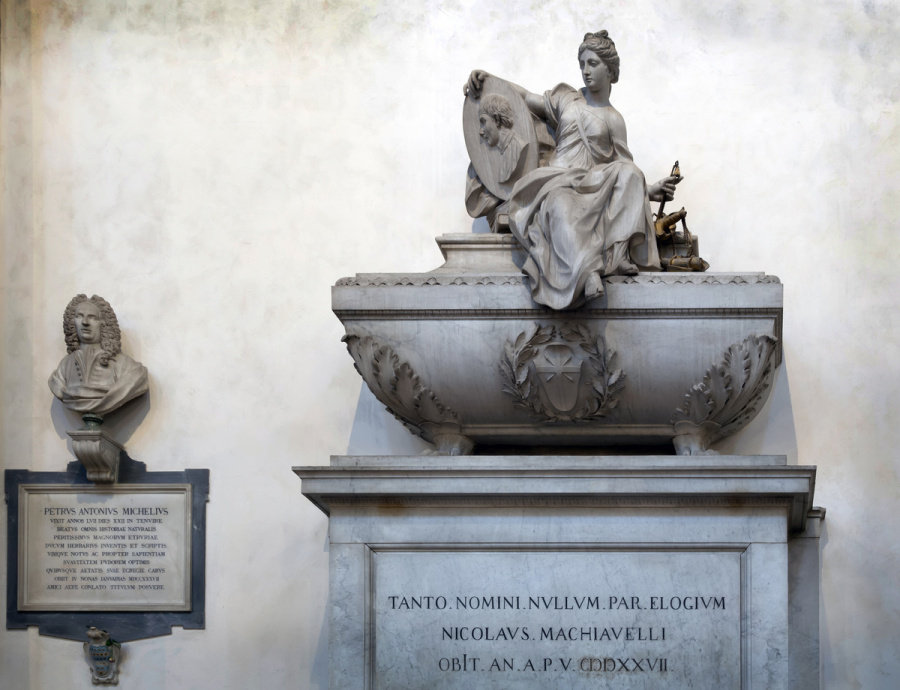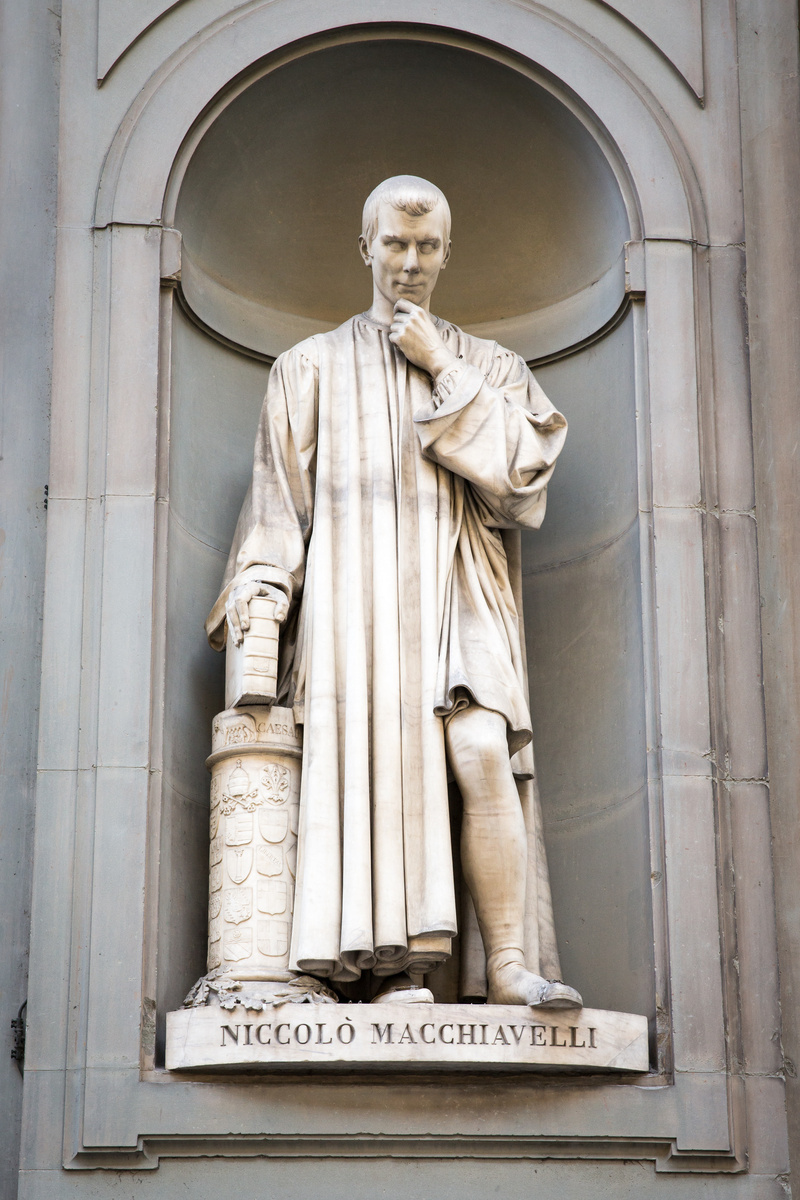
- 記事一覧
- ゲストライター記事一覧
- Lessons From Machiavelli’s ’The Prince’ マキャベリの『君主論』からの教訓
Lessons From Machiavelli’s ’The Prince’ マキャベリの『君主論』からの教訓

A short disclaimer in advance. I am only a philosopher by heart and not by training. Therefore, the following text only reflects my personal interpretation and lessons, which I took from the philosophy of Machiavelli.
In the 16th century, the Italian philosopher and political theorist Niccolò Machiavelli (1469-1527) wrote his magnum opus titled ’The Prince’ (’Il Principe’). It is a comprehensive guide for political governance that offers valuable lessons for effective leadership. Due to its controversial moral nature, the work of Machiavelli has generally fallen from grace. Today, his name has even become a synonym for an immoral political actor. To be precise, according to the ‘Online Etymological Dictionary’, the term ’Machiavellian’ describes a person who is “cunning, deceitful, habitually duplicitous, unscrupulous, destitute of political morality”. However, the current negative interpretation of the term does not reflect Machiavelli's actual political philosophy. In essence, his political theories are not immoral, but rather a realistic and honest assessment of monarchical rulership. Although the moral nature of ’The Prince’ remains highly debatable, it nonetheless provides the reader with valuable information about the delicate art of political governance. This article briefly discusses three crucial maxims of Machiavelli’s political treatise.
The Balance Act between Generosity and Parsimony
“Nothing consumes itself so much as generosity, because while you practice it you’re losing the wherewithal to go on practicing it”.
(Machiavelli 2009, p. 64)
To begin with, maintaining the reputation of being a benevolent monarch is not an easy task. It is not only time-consuming, but also very expensive. Therefore, financial charity always carries the risk of leading to one's own indigence. According to Machiavelli, as soon as a ruler’s prosperity begins to turn into poverty, he will be forced to levy additional taxes in order to keep the administrative apparatus running. Such a shift in financial behavior carries a great risk, as the monarch could lose the favor of the people. If the ruler fails to maintain the support of his followers, his reign will eventually come to an end. Instead, Machiavelli proposes a different kind of generosity: “Since a ruler can’t be generous and show it without putting himself at risk, if he’s sensible he won’t mind getting a reputation for meanness. With time, when people see that his penny-pinching means he doesn’t need to raise taxes and can defend the country against attack and embark on campaigns without putting a burden on his people, he’ll increasingly be seen as generous – generous to those he takes nothing from [...]” (p. 62). In short, Machiavelli proclaims that for established monarchs, classic generosity has never led to success: “In our own times the only leaders we’ve seen doing great things were all reckoned mean. The others were failures” (p. 63).
The Entanglement of Skill and Luck
“So these rulers of ours, who were well-established kings and dukes yet still lost their states, should spare us their bad-luck stories; they have only themselves to blame”. (Machiavelli 2009, p. 97).
What does it take to become a successful monarch? Skill or luck? For Machiavelli, the answer was simple: ‘Skill always beats luck’. Fortune might lead to a prospective outcome, but only in the short-term.
An aspiring politician may rise to a high-level position due to fortunate circumstances, but luck alone will not be enough to secure his status in the long run. The Roman philosopher Seneca argued once that “Luck is what happens when preparation meets opportunity” (p. 1). Machiavelli, in contrast, slightly disagrees by proclaiming that luck might change, but preparation will always be valuable. Essentially, life can be best understood as an entanglement of fate and choice: “[...] I reckon it may be true that luck decides the half of what we do, but it leaves the other half, more or less, to us” (p. 98). Without doubt, fate can be a cruel mistress. Nevertheless, in times of need, a skillful ruler can always draw on his own abilities to avert the blows of fate. Machiavelli summarized it bluntly by saying that “[...]those who haven’t relied too much on lucky circumstances have lasted longer” (p. 21). Fortunately, ‘The Prince’ even offers a simple advice on how monarchs can increase their probability of luck: “[...] it’s better to be impulsive than cautious; fortune is female and if you want to stay on top of her you have to slap and thrust. You’ll see she’s more likely to yield that way than to men who go about her coldly” (p. 101).
The Debate about Love and Fear
“[...] if you always want to play the good man in a world where most people are not good, you’ll end up badly. Hence, if a ruler wants to survive, he’ll have to learn to stop being good, at least when the occasion demands”.
(Machiavelli 2009, p. 60)
Love is perhaps the greatest value of Christianity. However, should it also be the key principle of a ruler's reign? Machiavelli believes that since it is difficult for a ruler to be both feared and loved, it is much safer to be feared than loved, if one of the two must be lacking (p. 66). When it comes to political governance, there is a simple reason why fear is superior to love. Love is not a dependable means of crowd control. In essence, Machiavelli argues that while a leader has no influence on who loves him, it is within his power to decide who fears him: “[…] since people decide for themselves whether to love a ruler or not, while it’s the ruler who decides whether they’re going to fear him, a sensible man will base his power on what he controls, not on what others have freedom to choose” (p. 68). To support his thesis, Machiavelli makes historical references to the two famous military leaders Hannibal (247 BCE – c.a. 183-181 BCE) and Cesare Borgia (1475-1507). The Carthaginian general Hannibal effectively utilized respect and fear (achieved through “tremendous cruelty” (p. 67)) to keep strict control over his multiracial army. The former Italian cardinal and mercenary leader Cesare Borgia also built his reign partly on violence. He was a prime example of a ruthless leader who was able to balance his leadership style between cruelty and benevolence. Machiavelli only spoke in admiration of Borgia: “Cesare Borgia was thought to be cruel, yet his cruelty restored order to Romagna and united it, making the region peaceful and loyal” (p. 65). In the end, Machiavelli’s verdict was clear: ‘Fear prevails over love’.
Certainly, Machiavelli's work is far more complicated than presented in this article. However, a detailed analysis would go beyond the scope of this text. What makes Machiavelli’s ’The Prince’ worth reading is its approach to reveal the unsparing truth about the power play behind state governance. In the end, it remains to be a must-read for every person who is interested in the fine art of political leadership.
マキャベリの『君主論』からの教訓
あらかじめ簡単に免責事項を書いておきます。私はあくまでも哲学愛好家であり、哲学者としての訓練を受けているわけではありません。したがって、以下の文章は、マキャベリの哲学から得た、私の個人的な解釈と教訓を反映したものに過ぎません。
16世紀、イタリアの哲学者であり政治理論家のニッコロ・マキャベリ(1469-1527)は、『君主論』('Il Principe')と題する大作を執筆した。この本は、政治的統治のための包括的なガイドであり、効果的にリーダーシップを取るために必要な教訓を示している。マキャベリの著作は、その道徳的な性質が物議を醸すため、人々から尊敬されることはなかった。今日、彼の名前は不道徳な政治家の代名詞とさえなっている。「オンライン語源辞典」によると、「マキャベリアン」という言葉は、「ずる賢い、欺瞞に満ちた、二枚舌、不謹慎、政治道徳に欠ける」人物を表している。しかし、この著作に対する否定的な解釈は、マキアヴェリの実際の政治哲学を反映してはいない。本来、彼の政治理論は不道徳なものではなく、むしろ君主支配に対する現実的で正直な評価なのである。『君主論』の道徳的な部分については依然として大きな議論の余地があるが、それでも、この本は政治的統治の為に必要とされる繊細なスキルについての重要な情報を提供している。本稿では、マキアヴェリの政治論集から、3つの重要な格言を取り上げ、簡単に説明する。
寛容と倹約のバランス
「寛大さほど自分を消耗させるものはない。なぜなら、それを実践している間に それを実践し続けるための手段を失ってしまうからだ」
(マキャベリ 2009, p.64)
まず、慈悲深い君主であるという評判を維持することは、簡単なことではない。時間がかかるだけでなく、とてもお金がかかるからだ。金銭的な慈善というのは、常に自らの困窮を招く危険性をはらんでいる。
マキャベリによれば、繁栄を遂げた君主が貧困に転じ始めるとすぐに、統治を維持するために追加の課税をせざるをえなくなる。このような財政行動の変化は、君主が民衆の支持を失いかねないという大きなリスクをはらんでいる。君主が民衆の支持を維持できなければ、その治世はやがて終焉を迎える。その代わりに、マキャベリは別の形での寛大さを提案している。
「君主というものは、自らを危険にさらすことなく気前よくそれを示すことはできない。賢明であれば、意地悪という評判を得ても気にするな。時が経ち、君主の節約志向が増税を必要とせず、国民に負担をかけずに国を攻撃から守り、政治活動を展開できるということ―すなわち、国民から何も奪うことなく気前がいい―ということを人々が知るようになれば、彼はますます寛大とみなされるようになるだろう」
つまり、マキャベリは、既成の君主にとって、古典的な寛大さが成功につながったことはないと宣言しているのである。
「私たちの時代には、偉大なことを成し遂げた唯一の指導者たちは、みな意地悪だった。他の指導者たちは失敗だった」(63ページ)。
技術と運のもつれ
「私達の君主たちは、王や公爵として確固たる地位を確立していたにもかかわらず、国を失ったのだ。そんな不運な話を我々に聞かせるべきではない。彼らが責めるべきなのは自分自身なのだから」
(マキャベリ 2009, p.97)
成功する君主になる為には何が必要なのだろう? 技術だろうか? 運だろうか? マキャベリにとって、その答えは簡単だった。「スキル(技術)は常に運に勝るものだ」
運はよい結果をもたらすかもしれないが、それは短期的なものでしかない。
政治家を志す者は、幸運に恵まれ高い地位に就くことはあっても、運だけでは長期にわたってその地位を確保することは出来ない。ローマの哲学者セネカはかつて、「運とは、準備と機会が出会ったときに起こるものだ」(p.1)と主張したが、これに対してマキャベリは、「運は変わるかもしれないが、準備というのは常に価値があるものだ」と主張し、セネカに対して若干の異論を唱えている。人生というのは、本質的には運と選択のもつれの結果として理解するのが一番である。「[...]私たちがすることの半分は運によって決められているというのは事実かもしれないが、残りの半分は、多かれ少なかれ私たちに委ねられているというのは本当かもしれない」(p.98)。運命は残酷な愛人であるとはいえ、いざとなれば、手腕にたけた支配者というのはいつでも自分の能力を発揮して、運命からの打撃を避けることが出来るのだ。マキャベリは、「幸運な境遇にあまり頼らなかった者ほど、長続きした」(21ページ)という言葉で、それを要約している。幸いにも、『君主論』の中で、マキャベリは君主が幸運を得る確率を高める方法について簡単なアドバイスまでしている。「用心深いよりも、衝動的であるほうがいい。フォーチュン(幸運)は女性なので、彼女の上に留まりたい場合は、叩いたり突いたりしなくてはならない。彼女を冷たくあしらう男よりも、そのような男に屈服する可能性が高いということがわかるだろう」(p. 101)。
愛と恐怖をめぐる論争
「ほとんどの人が善人でない世界で、常に善人を演じようとすれば、ひどい目に遭う。したがって、君主が生き残りたいのであれば、少なくともいざというときには善人であることをやめることを学ばなければならない」
(マキャベリ 2009, p.60)
愛は、おそらくキリスト教において最大の価値である。しかし、それは君主が世を治めるにあたっての重要な原則にもなるのだろうか。マキャベリは、君主が恐れられると同時に愛されるというのは難しいので、どちらかが欠けていなければならないとしたら、愛されるよりも恐れられる方がはるかに安全だ(p.66)と考えていた。
統治に関して言えば、恐怖が愛に勝るという単純な理由がある。愛は群衆を統制する手段としては頼りないものである。つまり、マキャベリは、支配者は自分を愛する者に影響を与えることはできないが、自分が誰に恐れられるかに関しては支配者の力の及ぶところであると主張しているのである。
「人々は支配者を愛するかどうか自分で決めるが、支配者を恐れるかどうかは支配者が決めるのだから、物事のわかる人間は、他人が何を選ぶかではなく、自分が何を支配するかによって自分の力を決める」(p.68)のである。マキャベリは、その理論を裏付けるものとして、2人の有名な軍事指導者ハンニバル(前247年-前183-181年頃)とチェーザレ・ボルジア(1475-1507年)の歴史に言及している。カルタゴの将軍ハンニバルは、尊敬と恐怖(「途方もない残酷さ」(p.67)によって達成)を効果的に利用し、多人種の軍隊を厳しく統制していた。また、イタリアの元枢機卿で傭兵のリーダーであったチェーザレ・ボルジアも、その治世を部分的には暴力を用いて築いたのである。
彼は冷酷な指導者の典型的な例であり、残酷さと慈悲深さとの間で自分の指導スタイルのバランスを取っていた。マキャベリは、ボルジアを賞賛する言葉しか口にしなかった。
「チェーザレ・ボルジアは残酷だと思われていたが、その残酷さがロマーニャに秩序を取り戻し、ロマーニャを統一して、この地域を平和で忠実なものにした」(P.65)。結局、マキャベリの下した評価は「恐怖は愛に勝る」というものであったのだ。
マキャベリの作品は、ここで紹介するよりもはるかに複雑である。しかし、彼の作品の詳細な分析はこの文章内で説明できる範囲を超えてしまうだろう。マキャベリの『君主論』が読むに値するのは、国家統治の背後にある権力闘争の真実をあますところなく明らかにしようとする姿勢にある。結局のところ、政治的なリーダーシップに関心を持つすべての人にとって、必読の書であることに変わりはない。
References
Machiavelli, N. (translated by Parks, T.) (2009) ’The Prince’, London, UK, Penguin Press.
Online Etymology Dictionary (2023) ’Machiavellian (adj.)’, online available at https://www.etymonline.com/word/machiavellian#:~:text=Machiavellian%20(adj.),to%20place%20advantage%20above%20morality accessed on January 27, 2023.
Seneca, L. A. (2018) ’99 Quotes by Seneca – Meditations to Live by’, online available at https://existentialstoic.files.wordpress.com/2018/08/99quotesbyseneca-export1.pdf accessed on January 27, 2023.

Recently Popular最近よく読まれている記事
-

食べていても痩せる 高齢者終末期のカヘキシア(悪液質)
食べていても痩せる。活発に運動を続けている人なら不思議に思わないが、介護度の高い高齢者にそのようなことが果たして起こるのだろうか。起こるのであれば、それはカヘキシアという病態であれば説明できる。 カヘキシア(悪液質)カヘキシアとは、食欲不振・体重減少・全身衰弱・倦怠感などを呈し、生命予後やQOL(qualit… -

終末期の自然な経過を見極めるとは
長期に渡り胃ろうからの栄養を続けていると、注入した物が食道へ逆流したり、唾液や痰の貯留が増えたりして、吸引を繰り返すことになるが、結局のところ、頻回の吸引も間に合わず、心肺停止状態で発見されることが多い。これでは看取りとは言えない。ここに至るまでの言葉を語れない人の苦しみ。このような事態を避ける智慧… -

自閉症スペクトラムと呼ばれているような障害は、実は障害ではない。生物としての人類のバリエーション(変異)の一つである。
自閉症スペクトラムと呼ばれているような障害は、実は障害ではない。生物としての人類のバリエーション(変異)の一つである。本来は人類の、生息環境に対する適応の一つのあり方だというのが、ニューロダイバーシテイ(脳多様性)という考え方に他ならない(詳しくは正高信男著『ニューロダイバーシテイと発達障害』(北大… -

社会保障分野での普遍主義と選別主義について
介護保険や医療保険では、貧富にかかわらず保険によって9割が給付(自己負担は1割)あるいは、7割が給付(自己負担は3割)される。この様な社会保障の方式は、「普遍主義」といわれている。「普遍主義」は、義務教育や、最近では高等学校の授業料にも適応されている(この場合も裕福な人も貧しい人も同様に無償である)。反… -

飲まず食わず(自発的飲食中止)という選択、VSEDをご存知ですか?
前回(Opinionsで9月24日配信記事)は有馬斉氏による安楽死の分類と、我が国の現状についてお伝えしました。また我が国においては、医師の致死的薬剤の処方による積極的安楽死は、法的に支持されていないということもお話ししました。諸外国では医師による致死的薬剤処方による安楽死が認められている国もありますが、もち… -

医療崩壊
ある日の外来。朝の9時から診察室に座りっぱなしでそろそろ3時間が経過。既に再診患だけではなく、その日の新患も回ってきます。で、そうした中に問題のおじさんがいました。「今、○○クリニックで薬をもらっていまして・・・」「30日分貰っているのですが、お腹が痛くなったので、診てもらいに来ました」「○○先生の紹介…
Writer ライター
-
 公職勤務/政策研究・防衛行政・文化政策黒乃 流星
公職勤務/政策研究・防衛行政・文化政策黒乃 流星黒乃 流星の記事を見る
-
 会社員宮田 宗知
会社員宮田 宗知宮田 宗知の記事を見る
-
 公益財団法人橋本財団事務局通信
公益財団法人橋本財団事務局通信事務局通信の記事を見る
-
 広島文教大学 教授/スクラムユニオン・ひろしま 執行委員岩下 康子
広島文教大学 教授/スクラムユニオン・ひろしま 執行委員岩下 康子岩下 康子の記事を見る
-
 「ことばの力教室」主宰 子どもの表現力育成アドバイザー/フリーライター・講師二村 昌子
「ことばの力教室」主宰 子どもの表現力育成アドバイザー/フリーライター・講師二村 昌子二村 昌子の記事を見る
-
 受賞作品Opinionsエッセイ
受賞作品OpinionsエッセイOpinionsエッセイの記事を見る
-
 ペンネーム東沖 和季
ペンネーム東沖 和季東沖 和季の記事を見る
-
 ニセコ在住下田 伸一
ニセコ在住下田 伸一下田 伸一の記事を見る
-
 ペンネーム 看護師宇梶 正
ペンネーム 看護師宇梶 正宇梶 正の記事を見る
-
 武蔵野大学大学院大谷 航介
武蔵野大学大学院大谷 航介大谷 航介の記事を見る
-
 一般社団法人村楽東 大史
一般社団法人村楽東 大史東 大史の記事を見る
-
 会社員池松 俊哉
会社員池松 俊哉池松 俊哉の記事を見る
-
 (公財)橋本財団研究助成 成果報告
(公財)橋本財団研究助成 成果報告研究助成 成果報告の記事を見る
-
 横浜市立大学小林 天音
横浜市立大学小林 天音小林 天音の記事を見る
-
 東京西徳洲会病院小児医療センター 小児神経科医師秋谷 進
東京西徳洲会病院小児医療センター 小児神経科医師秋谷 進秋谷 進の記事を見る
-
 公益財団法人地方自治総合研究所 常任研究員坂本 誠
公益財団法人地方自治総合研究所 常任研究員坂本 誠坂本 誠の記事を見る
-
 ペンネームAurora
ペンネームAuroraAuroraの記事を見る
-
 つむぐ株式会社 代表取締役竹村 仁量
つむぐ株式会社 代表取締役竹村 仁量竹村 仁量の記事を見る
-
 岡山大学学術研究院医歯薬学域長谷井 嬢
岡山大学学術研究院医歯薬学域長谷井 嬢長谷井 嬢の記事を見る
-
 ソシエタス総合研究所 研究員Karki Shyam Kumar (カルキ シャム クマル)
ソシエタス総合研究所 研究員Karki Shyam Kumar (カルキ シャム クマル)Karki Shyam Kumar (カルキ シャム クマル)の記事を見る
-
 NPO法人妊娠しぇるとSOS 理事長小林 智子
NPO法人妊娠しぇるとSOS 理事長小林 智子小林 智子の記事を見る
-
 書きたい人のためのwebマガジンOpinions編集部
書きたい人のためのwebマガジンOpinions編集部Opinions編集部の記事を見る
-
 介護福祉士渡口 将生
介護福祉士渡口 将生渡口 将生の記事を見る
-
 相談支援専門員・福祉ネイリストゆき
相談支援専門員・福祉ネイリストゆきゆきの記事を見る
-
 株式会社ありがとうファーム取締役副社長馬場 拓郎
株式会社ありがとうファーム取締役副社長馬場 拓郎馬場 拓郎の記事を見る
-
 ジャーナリスト ペンネームジョワキン
ジャーナリスト ペンネームジョワキンジョワキンの記事を見る
-
 ソシエタス総合研究所 研究員Andi Holik Ramdani(アンディ ホリック ラムダニ)
ソシエタス総合研究所 研究員Andi Holik Ramdani(アンディ ホリック ラムダニ)Andi Holik Ramdani(アンディ ホリック ラムダニ)の記事を見る
-
 ソシエタス総合研究所 研究員Waode Hanifah Istiqomah(ワオデ ハニファー イスティコマー)
ソシエタス総合研究所 研究員Waode Hanifah Istiqomah(ワオデ ハニファー イスティコマー)Waode Hanifah Istiqomah(ワオデ ハニファー イスティコマー)の記事を見る
-
 元芝園団地自治会岡﨑 広樹
元芝園団地自治会岡﨑 広樹岡﨑 広樹の記事を見る
-
 岡山外語学院留学生カーン エムディ マムン
岡山外語学院留学生カーン エムディ マムンカーン エムディ マムンの記事を見る
-
 行政書士板垣 岳人
行政書士板垣 岳人板垣 岳人の記事を見る
-
 Crimson Education教育コンサルタント蘇 暁辰(Xiaochen Su)
Crimson Education教育コンサルタント蘇 暁辰(Xiaochen Su)蘇 暁辰(Xiaochen Su)の記事を見る
-
 神戸大学准教授斉藤 善久
神戸大学准教授斉藤 善久斉藤 善久の記事を見る
-
 ドイツ在住阿部プッシェル 薫
ドイツ在住阿部プッシェル 薫阿部プッシェル 薫の記事を見る
-
 ライター/編集者黒部 麻子
ライター/編集者黒部 麻子黒部 麻子の記事を見る
-
 翻訳家田尻 潤子
翻訳家田尻 潤子田尻 潤子の記事を見る
-
 アブダビ環境庁長官 Environment Agency – Abu Dhabi (ead.gov.ae)シャイカ・サレム・アル・ダヘリ
アブダビ環境庁長官 Environment Agency – Abu Dhabi (ead.gov.ae)シャイカ・サレム・アル・ダヘリシャイカ・サレム・アル・ダヘリの記事を見る
-
 元整形外科医/農園主散木洞人
元整形外科医/農園主散木洞人散木洞人の記事を見る
-
 豊橋技術科学大学パク ミンジョン
豊橋技術科学大学パク ミンジョンパク ミンジョンの記事を見る
-
 生理革命委員会澤田まりあ、山形萌花、山領珊南
生理革命委員会澤田まりあ、山形萌花、山領珊南澤田まりあ、山形萌花、山領珊南の記事を見る
-
 SOMPOケア株式会社藤田 定司
SOMPOケア株式会社藤田 定司藤田 定司の記事を見る
-
 おかやま山陽高等学校橘 里香サニヤ
おかやま山陽高等学校橘 里香サニヤ橘 里香サニヤの記事を見る
-
 ソシエタス総合研究所 研究員坂入 悦子
ソシエタス総合研究所 研究員坂入 悦子坂入 悦子の記事を見る
-
 Hiro山下行政書士国際法務事務所 代表山下裕司
Hiro山下行政書士国際法務事務所 代表山下裕司山下裕司の記事を見る
-
 ソシエタス総合研究所 研究員Niklas Holzapfel ホルツ アッペル ニクラス
ソシエタス総合研究所 研究員Niklas Holzapfel ホルツ アッペル ニクラスNiklas Holzapfel ホルツ アッペル ニクラスの記事を見る
-
 サウンドエンジニアEmre・Ekici エムレ・エキジ
サウンドエンジニアEmre・Ekici エムレ・エキジEmre・Ekici エムレ・エキジの記事を見る
-
 NPO法人岡山県国際団体協議会
NPO法人岡山県国際団体協議会岡山県国際団体協議会の記事を見る
-
 岡山大学 学術研究院 社会文化科学学域 教授東條 光彦
岡山大学 学術研究院 社会文化科学学域 教授東條 光彦東條 光彦の記事を見る
-
 福岡大学 名誉教授田村 和夫
福岡大学 名誉教授田村 和夫田村 和夫の記事を見る
-
 ソシエタス総合研究所 研究員相川 真穂
ソシエタス総合研究所 研究員相川 真穂相川 真穂の記事を見る
-
 一般社団法人京都総合科学研究所 アドバイザー松村 道郎
一般社団法人京都総合科学研究所 アドバイザー松村 道郎松村 道郎の記事を見る
-
 ワラム株式会社 代表取締役加藤 侑子
ワラム株式会社 代表取締役加藤 侑子加藤 侑子の記事を見る
-
 岡山市立操南中学校 教諭/NPO法人国際協力研究所・岡山代表理事竹島 潤
岡山市立操南中学校 教諭/NPO法人国際協力研究所・岡山代表理事竹島 潤竹島 潤の記事を見る
-
 新西横浜街の予防医療ケア研究室 保健師・看護師・元先端バイオ創薬ベンチャー取締役五十嵐 直敬
新西横浜街の予防医療ケア研究室 保健師・看護師・元先端バイオ創薬ベンチャー取締役五十嵐 直敬五十嵐 直敬の記事を見る
-
 共著橋本俊明・秋吉湖音
共著橋本俊明・秋吉湖音橋本俊明・秋吉湖音の記事を見る
-
 ライター菊池 洋勝
ライター菊池 洋勝菊池 洋勝の記事を見る
-
 大東文化大学国際関係学部・特任教授 高崎経済大学経済学部・非常勤講師 目白大学経営学部経営学科&目白大学大学院経営学研究科 非常勤講師 長崎県佐世保市役所 経済活性化~産業振興に関するアドバイザー、博士(経済学)江崎 康弘
大東文化大学国際関係学部・特任教授 高崎経済大学経済学部・非常勤講師 目白大学経営学部経営学科&目白大学大学院経営学研究科 非常勤講師 長崎県佐世保市役所 経済活性化~産業振興に関するアドバイザー、博士(経済学)江崎 康弘江崎 康弘の記事を見る
-
 ソシエタス総合研究所 研究員秋吉 湖音
ソシエタス総合研究所 研究員秋吉 湖音秋吉 湖音の記事を見る
-
 JICA専門家足立 伸也
JICA専門家足立 伸也足立 伸也の記事を見る
-
 富士通株式会社 第三ファイナンス事業本部 シニアマネージャー安留 義孝
富士通株式会社 第三ファイナンス事業本部 シニアマネージャー安留 義孝安留 義孝の記事を見る
-
 EDAS(イーダス)理事長田村 拓
EDAS(イーダス)理事長田村 拓田村 拓の記事を見る
-
 監督・プロデューサー湯浅 典子
監督・プロデューサー湯浅 典子湯浅 典子の記事を見る
-
 日本経済大学 准教授山下 誠矢
日本経済大学 准教授山下 誠矢山下 誠矢の記事を見る
-
 人と医療の研究室 代表池尻 達紀
人と医療の研究室 代表池尻 達紀池尻 達紀の記事を見る
-
 一般社団法人飛島学園 代表理事堂野 博之
一般社団法人飛島学園 代表理事堂野 博之堂野 博之の記事を見る
-
 ニッセイ基礎研究所 生活研究部 主任研究員、ヘルスケアリサーチセンター・ジェロントロジー推進室兼任金 明中
ニッセイ基礎研究所 生活研究部 主任研究員、ヘルスケアリサーチセンター・ジェロントロジー推進室兼任金 明中金 明中の記事を見る
-
 医療法人財団足立病院 理事長、社会福祉法人あだち福祉会 理事長畑山 博
医療法人財団足立病院 理事長、社会福祉法人あだち福祉会 理事長畑山 博畑山 博の記事を見る
-
 教育研究家、合同会社ライフ&ワーク代表妹尾 昌俊
教育研究家、合同会社ライフ&ワーク代表妹尾 昌俊妹尾 昌俊の記事を見る
-
 ハーバード大学ベス・イスラエル・ディーコネス・メディカルセンター、高度消化管/最小侵襲外科フェロー中元 啓太郎
ハーバード大学ベス・イスラエル・ディーコネス・メディカルセンター、高度消化管/最小侵襲外科フェロー中元 啓太郎中元 啓太郎の記事を見る
-
 ソシエタス総合研究所 主任研究員井上 登紀子
ソシエタス総合研究所 主任研究員井上 登紀子井上 登紀子の記事を見る
-
 ソシエタス総合研究所 研究員松田 郁乃
ソシエタス総合研究所 研究員松田 郁乃松田 郁乃の記事を見る
-
 ソシエタス総合研究所 研究員アイシェ・ウルグン・ソゼン Ayse Ilgin Sozen
ソシエタス総合研究所 研究員アイシェ・ウルグン・ソゼン Ayse Ilgin Sozenアイシェ・ウルグン・ソゼン Ayse Ilgin Sozenの記事を見る
-
 NPO法人岡山市子どもセンター 事務局久川 春菜
NPO法人岡山市子どもセンター 事務局久川 春菜久川 春菜の記事を見る
-
 ユースワーカー(Youth Woker)森分 志学
ユースワーカー(Youth Woker)森分 志学森分 志学の記事を見る
-
 ペンネーム三村 喜久雄
ペンネーム三村 喜久雄三村 喜久雄の記事を見る
-
 ペンネーム黒木 洋一郎
ペンネーム黒木 洋一郎黒木 洋一郎の記事を見る
-
 NPO法人チャリティーサンタ 理事河津 泉
NPO法人チャリティーサンタ 理事河津 泉河津 泉の記事を見る
-
 金沢大学人間社会学域地域創造学類・准教授 、特定非営利活動法人国土利用再編研究所・理事長林 直樹
金沢大学人間社会学域地域創造学類・准教授 、特定非営利活動法人国土利用再編研究所・理事長林 直樹林 直樹の記事を見る
-
 認定NPO法人ペアレント・サポートすてっぷ理事長安藤希代子
認定NPO法人ペアレント・サポートすてっぷ理事長安藤希代子安藤希代子の記事を見る
-
 カリフォルニア大学サンフランシスコ校小児胸部心臓外科教授佐野俊二
カリフォルニア大学サンフランシスコ校小児胸部心臓外科教授佐野俊二佐野俊二の記事を見る
-
 社会福祉法人 旭川荘 ひらたえがお保育園 園長江田 加代子
社会福祉法人 旭川荘 ひらたえがお保育園 園長江田 加代子江田 加代子の記事を見る
-
 NPO法人 おかやまUFE 副理事長 ・NPO法人 おかやまUFE 事務局阪井 ひとみ・永松千恵
NPO法人 おかやまUFE 副理事長 ・NPO法人 おかやまUFE 事務局阪井 ひとみ・永松千恵阪井 ひとみ・永松千恵 の記事を見る
-
 社会学者 東京大学名誉教授 認定NPO法人ウィメンズアクションネットワーク(WAN)理事長 上野 千鶴子
社会学者 東京大学名誉教授 認定NPO法人ウィメンズアクションネットワーク(WAN)理事長 上野 千鶴子上野 千鶴子 の記事を見る
-
 外務省 国際保健政策室長 鷲見 学
外務省 国際保健政策室長 鷲見 学鷲見 学の記事を見る
-
 プロ・アダプティブ・サーファー藤原(旧姓:川上)智貴
プロ・アダプティブ・サーファー藤原(旧姓:川上)智貴藤原(旧姓:川上)智貴の記事を見る
-
 京都大学霊長類研究所 教授正高信男
京都大学霊長類研究所 教授正高信男正高信男の記事を見る
-
 社会医療法人石川記念会HITO病院緩和ケア内科統括部長大坂巌
社会医療法人石川記念会HITO病院緩和ケア内科統括部長大坂巌大坂巌の記事を見る
-
 東京医療学院大学保健医療学部教授上田 諭
東京医療学院大学保健医療学部教授上田 諭上田 諭の記事を見る
-
 「夢を叶える145」ライター宮村孝博
「夢を叶える145」ライター宮村孝博宮村孝博の記事を見る
-
 NPO法人 Anneの家 代表 美作地区里親会会員松本芳也・淳子夫妻
NPO法人 Anneの家 代表 美作地区里親会会員松本芳也・淳子夫妻松本芳也・淳子夫妻の記事を見る
-
 特定非営利活動法人あかね 代表理事中山 遼
特定非営利活動法人あかね 代表理事中山 遼中山 遼の記事を見る
-
 大阪市立総合医療センター 緩和医療科部長 兼 緩和ケアセンター長 大阪市立大学医学部臨床准教授 一般社団法人「こどものホスピスプロジェクト」常務理事 日本小児科学会専門医 英国カーディフ大学緩和ケア認定医(Certificate in Palliative Care) 日本緩和医療学会暫定多田羅竜平
大阪市立総合医療センター 緩和医療科部長 兼 緩和ケアセンター長 大阪市立大学医学部臨床准教授 一般社団法人「こどものホスピスプロジェクト」常務理事 日本小児科学会専門医 英国カーディフ大学緩和ケア認定医(Certificate in Palliative Care) 日本緩和医療学会暫定多田羅竜平多田羅竜平の記事を見る
-
 NPO法人 岡山マインド「こころ」/代表理事 一般社団法人お互いさま・まびラボ/副代表理事多田伸志
NPO法人 岡山マインド「こころ」/代表理事 一般社団法人お互いさま・まびラボ/副代表理事多田伸志多田伸志の記事を見る
-
 一般社団法人MY TREE代表理事 MY TREEペアレンツ・プログラムスーパーバイザー 認定フェミニストカウンセラー (公認心理師)中川和子
一般社団法人MY TREE代表理事 MY TREEペアレンツ・プログラムスーパーバイザー 認定フェミニストカウンセラー (公認心理師)中川和子中川和子の記事を見る
-
 兵庫県立ひょうごこころの医療センター精神科医師小田 陽彦
兵庫県立ひょうごこころの医療センター精神科医師小田 陽彦小田 陽彦の記事を見る
-
 独立行政法人国立病院機構福山医療センター院長岩垣博己・堀井城一朗・矢野 平
独立行政法人国立病院機構福山医療センター院長岩垣博己・堀井城一朗・矢野 平岩垣博己・堀井城一朗・矢野 平の記事を見る
-
 岡山大学 教授 文学部長田中 共子
岡山大学 教授 文学部長田中 共子田中 共子の記事を見る
-
 Civil Engineer (仕組みつくりの技術者)石田篤史
Civil Engineer (仕組みつくりの技術者)石田篤史石田篤史の記事を見る
-
 一般財団法人キヤノングローバル戦略研究所 研究主幹・経済学博士松山幸弘
一般財団法人キヤノングローバル戦略研究所 研究主幹・経済学博士松山幸弘松山幸弘の記事を見る
-
 岡山大学生殖補助医療技術教育研究センター ART教育研究部門長・教授舟橋 弘晃
岡山大学生殖補助医療技術教育研究センター ART教育研究部門長・教授舟橋 弘晃舟橋 弘晃の記事を見る
-
 医療法人サンズ理事長浅野 直
医療法人サンズ理事長浅野 直浅野 直の記事を見る
-
 株式会社ヘリオス 代表執行役社長CEO鍵本忠尚
株式会社ヘリオス 代表執行役社長CEO鍵本忠尚鍵本忠尚の記事を見る
-
 慶應義塾大学文学部人間科学専攻教授(医療人類学) McGill大学人類学部・医療社会研究学部Ph.D.北中淳子
慶應義塾大学文学部人間科学専攻教授(医療人類学) McGill大学人類学部・医療社会研究学部Ph.D.北中淳子北中淳子の記事を見る
-
 岡山大学病院 緩和支持医療科片山英樹
岡山大学病院 緩和支持医療科片山英樹片山英樹の記事を見る
-
 岡山市役所 保健福祉企画総務課松岡克朗
岡山市役所 保健福祉企画総務課松岡克朗松岡克朗の記事を見る
-
 近現代史研究家青木康嘉
近現代史研究家青木康嘉青木康嘉の記事を見る
-
 独立行政法人国立病院機構福山医療センター院長岩垣博己・長谷川利路・中島正勝
独立行政法人国立病院機構福山医療センター院長岩垣博己・長谷川利路・中島正勝岩垣博己・長谷川利路・中島正勝の記事を見る
-
 岡山高等学院 副校長 水野文一郎
岡山高等学院 副校長 水野文一郎水野文一郎の記事を見る
-
 社会の仕組み屋、社会の編集者石原 達也
社会の仕組み屋、社会の編集者石原 達也石原 達也の記事を見る
-
 一般社団法人SGSG理事長/中国学園大学子ども学部講師野村泰介
一般社団法人SGSG理事長/中国学園大学子ども学部講師野村泰介野村泰介の記事を見る
-
 一橋大学経済研究所 教授神林 龍
一橋大学経済研究所 教授神林 龍神林 龍の記事を見る
-
 特定医療法人自由会 理事 (社会福祉法人敬友会 理事、公益財団法人橋本財団 理事)橋本 健二
特定医療法人自由会 理事 (社会福祉法人敬友会 理事、公益財団法人橋本財団 理事)橋本 健二橋本 健二の記事を見る
-
 医療法人社団 岡山二人クリニック 理事長、医学博士林 伸旨
医療法人社団 岡山二人クリニック 理事長、医学博士林 伸旨林 伸旨の記事を見る
-
 フリーライター渡辺嗣郎(わたなべ しろう)
フリーライター渡辺嗣郎(わたなべ しろう)渡辺嗣郎(わたなべ しろう)の記事を見る
-
 国立大学法人岡山大学 副理事(国際担当)横井 篤文
国立大学法人岡山大学 副理事(国際担当)横井 篤文横井 篤文の記事を見る
-
 ペンネームドクターX
ペンネームドクターXドクターXの記事を見る
-
 NPO法人 山村エンタープライズ 代表理事藤井裕也
NPO法人 山村エンタープライズ 代表理事藤井裕也藤井裕也の記事を見る
-
 キャンサー・ソリューションズ株式会社 代表取締役社長桜井 なおみ
キャンサー・ソリューションズ株式会社 代表取締役社長桜井 なおみ桜井 なおみの記事を見る
-
 AMDA(アムダ) グループ代表・認定非営利活動法人AMDA 理事長菅波 茂
AMDA(アムダ) グループ代表・認定非営利活動法人AMDA 理事長菅波 茂菅波 茂の記事を見る
-
 ふれあい歯科ごとう代表五島 朋幸
ふれあい歯科ごとう代表五島 朋幸五島 朋幸の記事を見る
-
 介護従事者髙田 浩一
介護従事者髙田 浩一髙田 浩一の記事を見る
-
 ケアマネ-ジャー・社会福祉士かえる ちから
ケアマネ-ジャー・社会福祉士かえる ちからかえる ちからの記事を見る
-
 五常・アンド・カンパニー株式会社 代表取締役社長慎 泰俊
五常・アンド・カンパニー株式会社 代表取締役社長慎 泰俊慎 泰俊の記事を見る
-
 NPO法人 ポケットサポート代表理事三好 祐也
NPO法人 ポケットサポート代表理事三好 祐也三好 祐也の記事を見る
-
 医療法人 寺田病院 院長板野 聡
医療法人 寺田病院 院長板野 聡板野 聡の記事を見る
-
 鳥取市立病院 地域医療総合支援センター 生活支援室 副室長、リハビリテーション部 副部長、歯科 医長目黒 道生
鳥取市立病院 地域医療総合支援センター 生活支援室 副室長、リハビリテーション部 副部長、歯科 医長目黒 道生目黒 道生の記事を見る
-
 鳥取市立病院地域医療総合支援センター長 鳥取市福祉部参与足立 誠司
鳥取市立病院地域医療総合支援センター長 鳥取市福祉部参与足立 誠司足立 誠司の記事を見る
-
 ペンネーム池井戸 高志
ペンネーム池井戸 高志池井戸 高志の記事を見る
-
 ペンネーム池田 出水
ペンネーム池田 出水池田 出水の記事を見る
-
 岡山大学大学院ヘルスシステム統合科学研究科教授松岡 順治
岡山大学大学院ヘルスシステム統合科学研究科教授松岡 順治松岡 順治の記事を見る
-
 鳥取市立病院 名誉院長田中 紀章
鳥取市立病院 名誉院長田中 紀章田中 紀章の記事を見る
-
 岡山大学大学院保健学研究科 副研究科長 教授齋藤 信也
岡山大学大学院保健学研究科 副研究科長 教授齋藤 信也齋藤 信也の記事を見る
-
 公益財団法人橋本財団 理事長、医学博士橋本 俊明
公益財団法人橋本財団 理事長、医学博士橋本 俊明橋本 俊明の記事を見る







